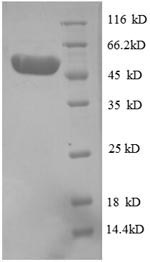Human PSME3 / PA28-gamma Recombinant Protein Product Attributes
Product Type: Recombinant Protein
Recombinant PSME3 / PA28-gamma based upon sequence from: Human
Host: QP8770 protein expressed in E. coli.
Tag: GST
Protein Construction: A DNA sequence encoding the Homo sapiens (Human) PSME3 / PA28-gamma, was expressed in the hosts and tags indicated. Please select your host/tag option, above.
Application Notes: Please contact us for application specific information for QP8770.
Bioactivity Data: Untested
Full Length? Partial (see sequence information for more details).
Expression Region: Ala2 – Thr252
Amino Acid Sequence: ASLLKVDQEV KLKVDSFRER ITSEAEDLVA NFFPKKLLEL DSFLKEPILN IHDLTQIHSD MNLPVPDPIL LTNSHDGLDG PTYKKRRLDE CEEAFQGTKV FVMPNGMLKS NQQLVDIIEK VKPEIRLLIE KCNTVKMWVQ LLIPRIEDGN NFGVSIQEET VAELRTVESE AASYLDQISR YYITRAKLVS KIAKYPHVED YRRTVTEIDE KEYISLRLII SELRNQYVTL HDMILKNIEK IKRPRSSNAE T
Purity: Greater than 90% as determined by SDS-PAGE.
Reconstitution Instructions:
Concentration of Human PSME3 / PA28-gamma Protein:
Endotoxin Levels: Not determined.
Buffer: Tris-based buffer, 50% glycerol
Storage Conditions: Store at -20C to -80C.
| Recombinant Human PSME3 / PA28-gamma Protein General Information | |
|---|---|
| Alternate Names | |
| PSME3; PA28-gamma; PA28-gamma; REG-GAMMA; PA28G; PA28gamma; HEL-S-283; Ki | |
| Curated Database and Bioinformatic Data | |
| Gene Symbol | PSME3 |
| Entrez Gene ID | 10197 |
| Ensemble Gene ID | ENSG00000131467 |
| RefSeq Protein Accession(s) | NP_005780.2 |
| RefSeq mRNA Accession(s) | NM_005789.3, NM_176863.2 |
| UniProt ID(s) | P61289 |
| UniGene ID(s) | Hs.152978 |
| HGNC ID(s) | HGNC:9570 |
| COSMIC ID Link(s) | PSME3 |
| KEGG Gene ID(s) | hsa:10197 |
| PharmGKB ID(s) | PA33916 |
| General Description of Recombinant Human PSME3 / PA28-gamma Protein. | |
| Subunit of the 11S REG-gamma (also called PA28-gamma) proteasome regulator, a doughnut-shaped homoheptamer which associates with the proteasome. 11S REG-gamma activates the trypsin-like catalytic subunit of the proteasome but inhibits the chymotrypsin-like and postglutamyl-preferring (PGPH) subunits. Facilitates the MDM2-p53/TP53 interaction which promotes ubiquitination- and MDM2-dependent proteasomal degradation of p53/TP53, limiting its accumulation and resulting in inhibited apoptosis after DNA damage. May also be involved in cell cycle regulation. | |
Limitations and Performance Guarantee
This is a life science research product (for Research Use Only). This product is guaranteed to work for a period of two years when stored at -70C or colder, and one year when aliquoted and stored at -20C.




There are no reviews yet.